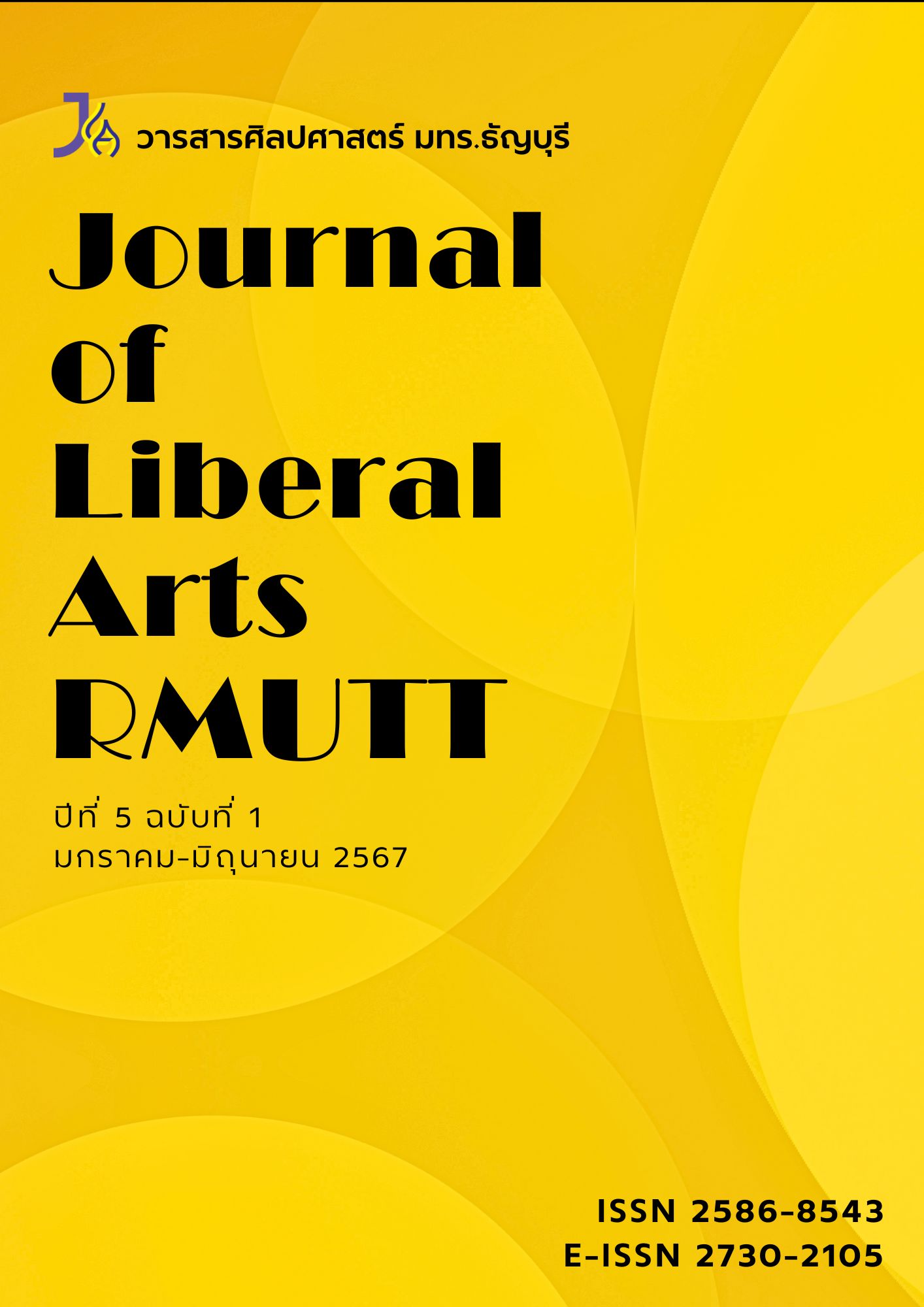การพัฒนารูปแบบการประเมินผลการเรียนออนไลน์ สำหรับนักศึกษาปริญญาตรีในมณฑลเสฉวน
DOI:
https://doi.org/10.60101/jla.2024.5.1.4412คำสำคัญ:
การเรียนรู้ออนไลน์, โมเดลการประเมินออนไลน์ , ปัญหาการเรียนออนไลน์ , ปัจจัยการประเมินการเรียนรู้ออนไลน์บทคัดย่อ
การเรียนรู้ออนไลน์เป็นช่องทางสำคัญในการเสาะหารู้ของผู้คน ดังนั้น การสร้างรูปแบบการประเมินการเรียนรู้ออนไลน์ที่มีประสิทธิภาพจึงกลายเป็นประเด็นเร่งด่วน การศึกษานี้ใช้การสัมภาษณ์และการสำรวจเพื่อทำความเข้าใจเชิงลึกเกี่ยวกับสถานะภาพการพัฒนาการเรียนรู้ออนไลน์ในปัจจุบัน ผลการวิจัยพบว่าการเรียนรู้ออนไลน์มีปัญหาจากการมีส่วนร่วมและแรงจูงใจของนักเรียนต่ำ เนื้อหาและวิธีการสอนที่จำกัด ผู้สอนมีองค์ความรู้ในการสอนไม่เพียงพอ ความสามารถในการสอนออนไลน์ไม่เพียงพอ ความเป็นส่วนตัวและความปลอดภัยทางระบบดิจิทัลที่ไม่สมบูรณ์ สภาพแวดล้อมทางเทคนิคและเงื่อนไขการใช้งานไม่สอดคล้องกัน และไม่มีการแบ่งปันทรัพยากรและปรับปรุงให้ทันสมัย ฯลฯ การศึกษานี้ใช้วิธี Delphi เพื่อสร้างแบบจำลองการประเมินการเรียนรู้ออนไลน์เพื่อใช้เป็นข้อมูลอ้างอิงเชิงปฏิบัติสำหรับการปฏิรูปการเรียนรู้ออนไลน์ โมเดลที่นำเสนอประกอบด้วยองค์ประกอบหลัก 4 ประการ ได้แก่ นักเรียน ครู การสนับสนุนด้านเทคนิค และทรัพยากรการเรียนรู้ สำหรับนักเรียน ควรส่งเสริมการมีส่วนร่วมในการเรียนรู้ ควรได้รับการสนับสนุนจากครอบครัว และควรมีความปรารถนาในการเรียนรู้ ในขณะที่ครูควรพิจารณาวิธีการสอน การออกแบบการสอน และการรับข้อมูลป้อนกลับในการสอน สำหรับการสนับสนุนทางเทคนิค ควรสนับสนุนความพร้อมใช้งานของแพลตฟอร์ม ความปลอดภัยทางเทคนิค และการสนับสนุนทางเทคนิคที่มีประสิทธิภาพ และสำหรับทรัพยากรการเรียนรู้ ควรใส่ใจเนื้อหาที่เหมาะสม เครื่องมือสื่อสาร และจัดการการใช้ทรัพยากรร่วมกัน
เอกสารอ้างอิง
Ally, M. (2004). Foundations of educational theory for online learning. Theory and practice of online learning, 2(1), 15-44.
Baran, E., & Correia, A. P. (2014). A professional development framework for online teaching. TechTrends, 58(5), 96-102.
Baran, E., Correia, A. P., & Thompson, A. (2011). Transforming online teaching practice: Critical analysis of the literature on the roles and competencies of online teachers. Distance education, 32(3), 421-439.
Cui, Y. (2021). An inquiry into online teaching strategies for high school solid geometry course. (Master's Degree Thesis). Liaoning Normal University, Liaoning, China.
Ferguson, R. (2012). Learning analytics: drivers, developments, and challenges. International Journal of Technology Enhanced Learning, 4(5-6), 304-317.
Hart, W.A. (2012). What Lessons Can We Learn? Journal of Philosophy of Education, 46, 663-673.
Hattie, J. (2008). Visible learning: A synthesis of over 800 meta-analyses relating to achievement. London, New York: Routledge.
Jonassen, D.H., & Ronrer-Murphy, L. (1999). Activity theory as a framework for designing constructivist learning environments. ETR&D, 47, 61-79.
Kirkpatrick, D.L., & Kirkpatrick, J.D. (2006). Evaluating training programs. San Francisco, CA: Berrett-Koehler Publishers.
McCarthy, E.D. (2005). Knowledge as Culture. London, New York: Routledge.
Koehler, M., & Mishra, P. (2009). What is technological pedagogical content knowledge (TPACK)? Contemporary issues in technology and teacher education, 9(1), 60-70.
Liu, R., & Wang, Y. (2021). Analysis of research hotspots and trends in online education in the past decade abroad. Chinese Journal of Medical Education Technology, 35(04), 414-421.
Means, B., Toyama, Y., Murphy, R., & Baki, M. (2014). The effectiveness of online and blended learning: A meta-analysis of empirical literature. Teachers College Record, 115(3), 1-47.
Means, B., Toyama, Y., Murphy, R., Bakia, M., & Jones, K. (2009). Evaluation of evidence-based practices in online learning: A meta-analysis and review of online learning studies. U.S. Department of Education.
Moore, T. (2013). Critical thinking: Seven definitions in search of a concept. Studies in Higher Education, 38(4), 506-522.
Owusu-Boampong, A., & Holmberg, C. (2015). Distance education in European higher education: The potential. Oslo: International Council for Open and Distance Education.
Peng, V. (2016). Educational Technology and Network Teaching Resources Integration. Beijing: Guangming Daily Publishing House.
Ryan, R.M., & Deci E.L. (2000). Self-determination theory and the facilitation of intrinsic motivation, social development, and well-being. American Psychologist, 55(1), 68-78.
Vlachopoulos, D. (2020). COVID-19: Threat or opportunity for online education? Higher Learning Research Communication, 10(1), 16–19.
Weber, E. (2015). How to assess students effectively diverse assessment strategies for promoting learning [M]. Beijing: China Light Industry Press.
Yu, Z. (2021). The effects of gender, educational level, and personality on online learning outcomes during the COVID-19 pandemic. International Journal of educational technology in higher education, 18, 1-17.
Zhang, C.H. (2021). Research on assessment for promoting student learning. Journal of Comparative Education, (1), 99-111.
ดาวน์โหลด
เผยแพร่แล้ว
รูปแบบการอ้างอิง
ฉบับ
ประเภทบทความ
สัญญาอนุญาต
ลิขสิทธิ์ (c) 2024 วารสารศิลปศาสตร์ มทร.ธัญบุรี

อนุญาตภายใต้เงื่อนไข Creative Commons Attribution-NonCommercial 4.0 International License.













